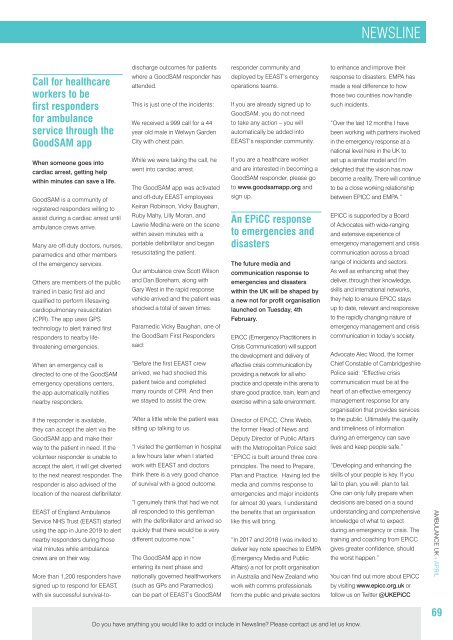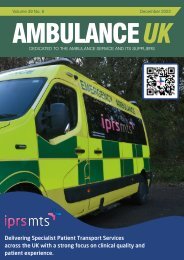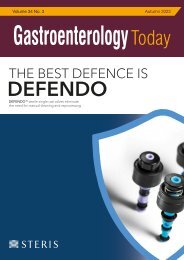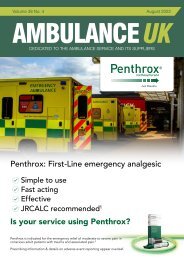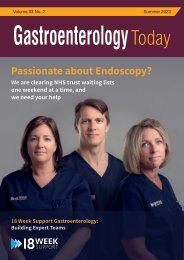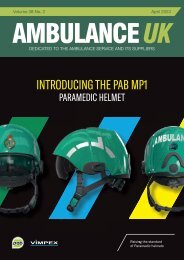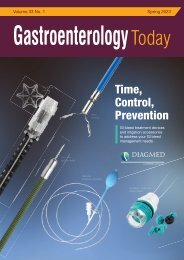Ambulance UK - April 2020
Create successful ePaper yourself
Turn your PDF publications into a flip-book with our unique Google optimized e-Paper software.
NEWSLINE<br />
Call for healthcare<br />
workers to be<br />
first responders<br />
for ambulance<br />
service through the<br />
GoodSAM app<br />
When someone goes into<br />
cardiac arrest, getting help<br />
within minutes can save a life.<br />
GoodSAM is a community of<br />
registered responders willing to<br />
assist during a cardiac arrest until<br />
ambulance crews arrive.<br />
Many are off-duty doctors, nurses,<br />
paramedics and other members<br />
of the emergency services.<br />
Others are members of the public<br />
trained in basic first aid and<br />
qualified to perform lifesaving<br />
cardiopulmonary resuscitation<br />
(CPR). The app uses GPS<br />
technology to alert trained first<br />
responders to nearby lifethreatening<br />
emergencies.<br />
When an emergency call is<br />
directed to one of the GoodSAM<br />
emergency operations centers,<br />
the app automatically notifies<br />
nearby responders.<br />
If the responder is available,<br />
they can accept the alert via the<br />
GoodSAM app and make their<br />
way to the patient in need. If the<br />
volunteer responder is unable to<br />
accept the alert, it will get diverted<br />
to the next nearest responder. The<br />
responder is also advised of the<br />
location of the nearest defibrillator.<br />
EEAST of England <strong>Ambulance</strong><br />
Service NHS Trust (EEAST) started<br />
using the app in June 2019 to alert<br />
nearby responders during those<br />
vital minutes while ambulance<br />
crews are on their way.<br />
More than 1,200 responders have<br />
signed up to respond for EEAST,<br />
with six successful survival-todischarge<br />
outcomes for patients<br />
where a GoodSAM responder has<br />
attended.<br />
This is just one of the incidents:<br />
We received a 999 call for a 44<br />
year old male in Welwyn Garden<br />
City with chest pain.<br />
While we were taking the call, he<br />
went into cardiac arrest.<br />
The GoodSAM app was activated<br />
and off-duty EEAST employees<br />
Keiran Robinson, Vicky Baughan,<br />
Ruby Mahy, Lilly Moran, and<br />
Lawrie Medina were on the scene<br />
within seven minutes with a<br />
portable defibrillator and began<br />
resuscitating the patient.<br />
Our ambulance crew Scott Wilson<br />
and Dan Boreham, along with<br />
Gary West in the rapid response<br />
vehicle arrived and the patient was<br />
shocked a total of seven times.<br />
Paramedic Vicky Baughan, one of<br />
the GoodSam First Responders<br />
said:<br />
“Before the first EEAST crew<br />
arrived, we had shocked this<br />
patient twice and completed<br />
many rounds of CPR. And then<br />
we stayed to assist the crew.<br />
“After a little while the patient was<br />
sitting up talking to us.<br />
“I visited the gentleman in hospital<br />
a few hours later when I started<br />
work with EEAST and doctors<br />
think there is a very good chance<br />
of survival with a good outcome.<br />
“I genuinely think that had we not<br />
all responded to this gentleman<br />
with the defibrillator and arrived so<br />
quickly that there would be a very<br />
different outcome now.“<br />
The GoodSAM app in now<br />
entering its next phase and<br />
nationally governed healthworkers<br />
(such as GPs and Paramedics)<br />
can be part of EEAST’s GoodSAM<br />
responder community and<br />
deployed by EEAST’s emergency<br />
operations teams.<br />
If you are already signed up to<br />
GoodSAM, you do not need<br />
to take any action – you will<br />
automatically be added into<br />
EEAST’s responder community.<br />
If you are a healthcare worker<br />
and are interested in becoming a<br />
GoodSAM responder, please go<br />
to www.goodsamapp.org and<br />
sign up.<br />
An EPiCC response<br />
to emergencies and<br />
disasters<br />
The future media and<br />
communication response to<br />
emergencies and disasters<br />
within the <strong>UK</strong> will be shaped by<br />
a new not for profit organisation<br />
launched on Tuesday, 4th<br />
February.<br />
EPiCC (Emergency Practitioners in<br />
Crisis Communication) will support<br />
the development and delivery of<br />
effective crisis communication by<br />
providing a network for all who<br />
practice and operate in this arena to<br />
share good practice, train, learn and<br />
exercise within a safe environment.<br />
Director of EPiCC, Chris Webb,<br />
the former Head of News and<br />
Deputy Director of Public Affairs<br />
with the Metropolitan Police said:<br />
“EPiCC is built around three core<br />
principles. The need to Prepare,<br />
Plan and Practice. Having led the<br />
media and comms response to<br />
emergencies and major incidents<br />
for almost 30 years, I understand<br />
the benefits that an organisation<br />
like this will bring.<br />
“In 2017 and 2018 I was invited to<br />
deliver key note speeches to EMPA<br />
(Emergency Media and Public<br />
Affairs) a not for profit organisation<br />
in Australia and New Zealand who<br />
work with comms professionals<br />
from the public and private sectors<br />
to enhance and improve their<br />
response to disasters. EMPA has<br />
made a real difference to how<br />
those two countries now handle<br />
such incidents.<br />
“Over the last 12 months I have<br />
been working with partners involved<br />
in the emergency response at a<br />
national level here in the <strong>UK</strong> to<br />
set up a similar model and I’m<br />
delighted that the vision has now<br />
become a reality. There will continue<br />
to be a close working relationship<br />
between EPICC and EMPA.”<br />
EPiCC is supported by a Board<br />
of Advocates with wide-ranging<br />
and extensive experience of<br />
emergency management and crisis<br />
communication across a broad<br />
range of incidents and sectors.<br />
As well as enhancing what they<br />
deliver, through their knowledge,<br />
skills and international networks,<br />
they help to ensure EPiCC stays<br />
up to date, relevant and responsive<br />
to the rapidly changing nature of<br />
emergency management and crisis<br />
communication in today’s society.<br />
Advocate Alec Wood, the former<br />
Chief Constable of Cambridgeshire<br />
Police said: “Effective crisis<br />
communication must be at the<br />
heart of an effective emergency<br />
management response for any<br />
organisation that provides services<br />
to the public. Ultimately the quality<br />
and timeliness of information<br />
during an emergency can save<br />
lives and keep people safe.”<br />
“Developing and enhancing the<br />
skills of your people is key. If you<br />
fail to plan, you will plan to fail.<br />
One can only fully prepare when<br />
decisions are based on a sound<br />
understanding and comprehensive<br />
knowledge of what to expect<br />
during an emergency or crisis. The<br />
training and coaching from EPiCC<br />
gives greater confidence, should<br />
the worst happen.”<br />
You can find out more about EPiCC<br />
by visiting www.epicc.org.uk or<br />
follow us on Twitter @<strong>UK</strong>EPiCC<br />
AMBULANCE <strong>UK</strong> - APRIL<br />
Do you have anything you would like to add or include in Newsline? Please contact us and let us know.<br />
69


